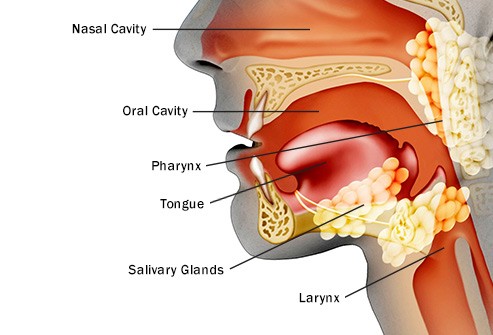
Diagnosed with Cancer? Your two greatest challenges are understanding cancer and understanding possible side effects from chemo and radiation. Knowledge is Power!
Learn about conventional, complementary, and integrative therapies.
Dealing with treatment side effects? Learn about evidence-based therapies to alleviate your symptoms.
Click the orange button to the right to learn more.
- You are here:
- Home »
- Blog »
- side effects ID and prevention »
- Larynx Cancer- “Lost salivary and swallow…”
Larynx Cancer- “Lost salivary and swallow…”

Hi David- Local oncologist did chemotherapy and radiation on my larynx cancer. Lost salivary and swallow. I need to get rid of feeding tube so I can eat real food again. Any ideas?
- Xerostomia (dry mouth) and
- Dysphagia (difficulty swallowing)
- chewing gum (this is a quick fix)
- biotene mouthwash- again, quick fix
- acupuncture- not a quick fix but should be able to restore salivary flow in time-
- hyperbaric oxygen therapy- again, not immediate results but can restore function in time-
- Cancer Survivor
- Cancer Coach
- Director PeopleBeatingCancer
- Glottic, Laryngeal Cancer-Preservation of the Larynx
- Laryngeal Cancer – Stage 2- Conventional vs. Non
- Anticipate,Treat Difficulty Swallowing- Dysphagia
- Early Stage Oral Cancer- Curative Therapy with Few Side
- Healing Radiation-induced Dysphagia- Difficulty Swallowing
- Human PapillomaVirus? Cancerous? AHCC?
Acupuncture for Radiation-Induced Xerostomia in Cancer Patients: A Systematic Review and Meta-Analysis
“Results: Eight clinical trials (725 participants) were analyzed, and 3 were included in a meta-analysis. All included trials had a high risk of bias, such as selection, performance, and detection bias.
Analysis indicated favorable effects of acupuncture regarding the improvement of xerostomia symptoms (MD −3.05, P = 0.02, 95% CI −5.58 to −0.52), compared with sham acupuncture. There were no significant differences between real acupuncture and sham acupuncture regarding the stimulated salivary flow rate (MD 0.37, P = 0.08, 95% CI −0.05 to 0.79) and unstimulated salivary flow rate (MD 0.09, P = 0.12, 95% CI −0.02 to 0.21), which were whole salivary flow rate.
Compared with no acupuncture (standard oral care, usual care, or no treatment), acupuncture produced a significant improvement in patient-reported xerostomia, without causing serious adverse effects. However, a Grading of Recommended Assessments analysis revealed that the quality of all acupuncture outcome measures was low.
Conclusion: The present meta-analysis and systematic review suggests that acupuncture is effective at improving xerostomia symptoms in cancer patients (larynx cancer) but not at objective salivary flow measurements. The evidence is still limited due to the low quality of the published studies…”
“Difficulty swallowing is called dysphagia. It means having trouble passing food or liquid down the throat. Some people may gag, cough, or choke when trying to swallow. Others may feel like food is stuck in their throat…
Swallowing therapy
Relieving side effects is an important part of cancer care (larynx cancer) and treatment. This is called palliative care or supportive care. Talk with your health care team about any symptoms you have. Make sure to bring up any new symptoms or a change in your symptoms.
Many people also benefit from starting swallowing therapy before cancer treatment, especially those with cancer in the throat. Therapy may include:
- Speech pathologist. Your doctor may refer you to a speech pathologist. This professional helps people use muscles in the mouth and throat. He or she will teach you new ways to swallow and to avoid choking and gagging. Some are Board Certified in Swallowing and Swallowing Disorders (BCS-S).
Eating tips for people with difficulty swallowing
Certain approaches may work better for some people than for others. This depends on the severity and cause of swallowing problems.
Try different types of food and ways of eating. Find what works best. And remember to eat a nutritious diet. Your food should have enough calories, protein, vitamins, and minerals.
Consider these tips:
- Eat soft, smooth foods, such as yogurt or pudding.
- Mash or blend foods. Or moisten dry foods with broth, sauce, butter, or milk.
- Try thickening liquids. Add gelatin, tapioca, baby rice cereal, or commercial thickening products.
- Use a straw to drink liquids and soft foods.
- Eat cold or room-temperature foods to reduce pain.
- Take small bites. Chew slowly and thoroughly.
- Eat small, frequent meals.
- Avoid foods that need a lot of chewing.
- Sit upright when eating or drinking.
- Choose foods high in calories and protein if you are losing weight. This includes eggs, milkshakes, casseroles, and nutritional shakes.
- Avoid dry, coarse, or hard foods.
- Drink meal replacement or nutritional supplement beverages.

